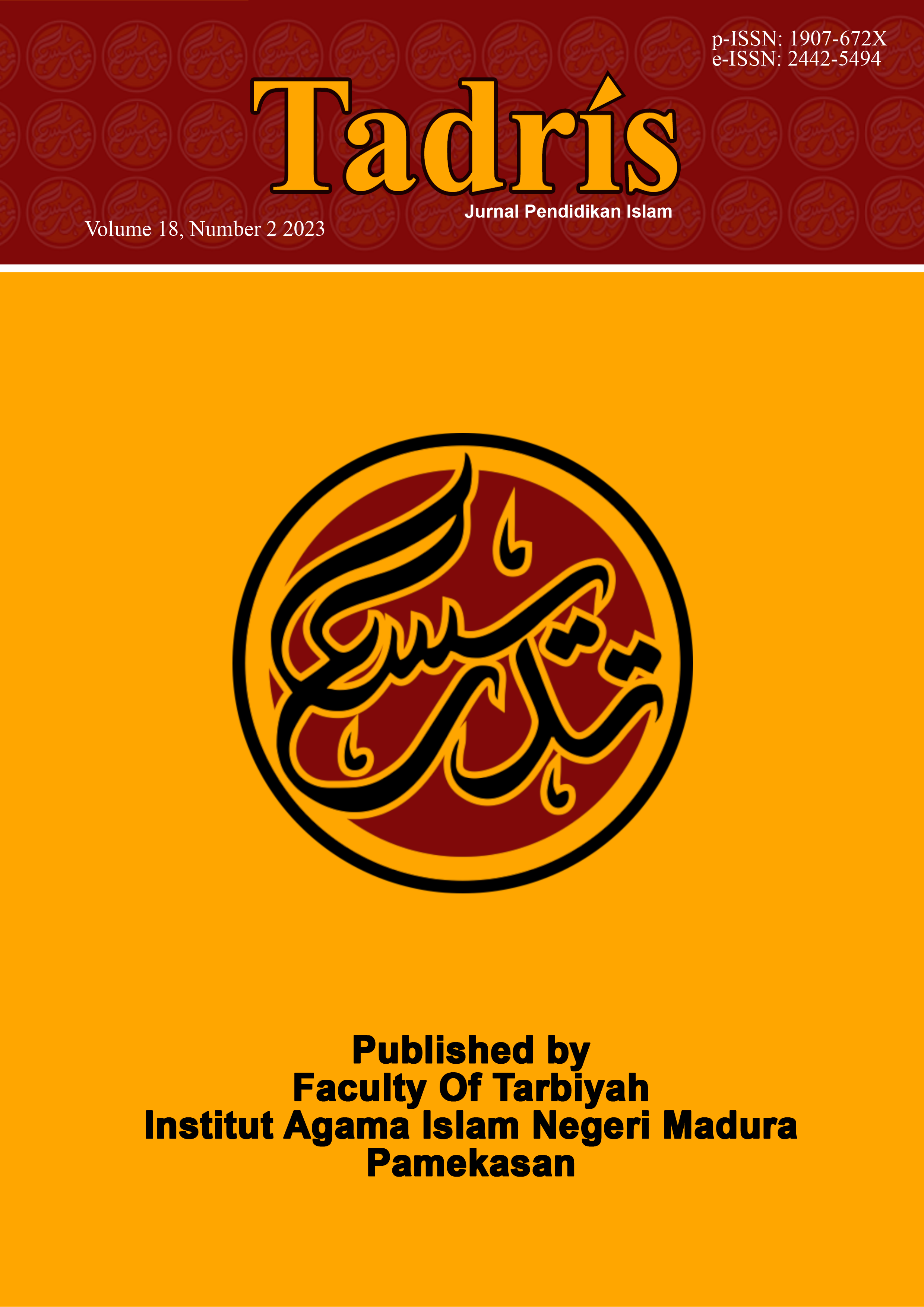The Development Model of the Digital-Based Madrasah Diniyah at Islamic Boarding School Padepokan Kyai Mudrikah Kembang Kuning
 Abstract views: 212
,
Abstract views: 212
,
 PDF downloads: 148
PDF downloads: 148
Abstract
Digital era has forced all educational institutions to change, including Madrasah Diniyah. Madrasah Diniyah, as a non-formal educational institution focused on teaching Islamic values, is required to adapt to these changes to remain relevant. This research aims to explore the digital-based development model of Madrasah Diniyah at Islamic Boarding School Padepokan Kyai Mudrikah Kembang Kuning Pamekasan (IBS PKMKK). The research method applied is a case study analysis, involving data collection through interviews, observations, and the evaluation of relevant documents. This study emphasizes the suitability of this digital development model with local needs and context. Although located in rural areas, IBS PKMKK Madrasah Diniyah has adapted to the demands of the modern era without abandoning its primary focus on religious education, becoming a kind of oasis that encourages the adoption of digital-based learning in a community that previously prioritized quality education less.
Downloads
References
Admin, IBS PKMKK. “Not Only Studying, Students at the Kiai Mudrikah Padepokan Are Also Tech-Savvy.,” 2023. https://padepokankyaimudrikah.net/landing/post/707b7bdf-615a-4714-8934-ce4f624c7bd0.
Aida, Azzahrah, Indra Adi Budiman, and Yuyun Dwi Haryanti. “Students’ Reflection on Learning.” Metaedukasi 1, no. 1 (2021).
Alfarizi, Arindra, and Bramastia. “Analysis of Teachers’ Abilities in Designing TPACK-Based Learning in Civic Education Subjects at UPT Public Senior High School 3 Banyuasin.” Proceedings of the National Seminar on Science Education (SNPS) 2022: "The Dynamics of Science Learning in the Independent Curriculum, 2022. https://repository.unsri.ac.id/67307/%0Ahttps://repository.unsri.ac.id/67307/3/RAMA_87205_06051281722021_0005026703_0005037604_01_front_ref.pdf.
Amin, M. Al’, and Achmad Rizal. “Multimedia-Based Calligraphy Art Learning Application in Awaliyah Islamic Elementary School, Bojongsana.” National Seminar on Information Technology and Multimedia 4, no. 8 (2016). https://ojs.amikom.ac.id/index.php/semnasteknomedia/article/view/1366/1283.
Duwi, Retnaningsih. “Challenges and Strategies for Teachers in the Era of the Fourth Industrial Revolution to Improve the Quality of Education.” In Proceedings of the National Seminar: Policies and Development of Education in the Era of the Fourth Industrial Revolution. Jakarta, 2019.
Efendi, Neng Marlina. “Digital Learning Revolution (The Use of Digital Animation in Start-Ups as a Method for Active Student Learning).” Habitus: Jurnal Pendidikan, Sosiologi, & Antropologi 2 2 (2019): 173. doi:doi:10.20961/habitus.v2i2.28788.
Evi Nurus Suroiyah. “The Benefits of Learning Arabic to Improve Listening Skills” 2, no. 2 (2020).
Fauzan, Moh, Hanik Mahliatussikah, Lala Durotus Salwa, M.A.Qoyyum Muliara, and Fatimah Mutmainnah. “Training on Digital Media Creation for Tajweed and Quranic Recitation for Prospective Teachers of Al-Muhsinat Islamic Boarding School in Bululwang, Malang.” Tifani : Jurnal Penelitian Dan Pengabdian Kepada Masyarakat 2, no. 2 (2022): 1–7. http://tifani.org/index.php/tifani/article/view/30%0Ahttp://tifani.org/index.php/tifani/article/download/30/18.
Holis, Mohammad. “Interview with the Director of Tasmi’ the Quran at IBS PKMKK.” 2023.
Indonesia, Ministry of Religious Affairs of the Republic of. Decision of the Minister of Religious Affairs of the Republic of Indonesia No. 347 Year 2022 Regarding Guidelines for the Implementation of the Independent Curriculum in Madrasahs (2022).
Listiana, Heni. “Interview with the CEO on Digital-Based Learning at IBS Padepokan Kyai Mudrikah Kembang Kuning.” 2023.
Muhlis, Achmad. “Muroja’ah Digital.” Pamekasan, 2022.
———. “The Curriculum Model of IBS Padepokan Kyai Mudrikah Kembang Kuning.” Pamekasan, 2023.
———. “The Development Team Discussing with IT and Digital Experts.” 2022.
of Religious and Islamic Boarding School Education, Directorate. Guidelines for the Implementation of Takmiliyah Madrasah Diniyah. (2023).
PKMKK, IBS. “Document of Development IBS Padepokan Kyai Mudrikah Kembang Kuning.” Pamekasan, Indonesia: IBS Padepokan Kyai Mudrikah Kembang Kuning, 2022.
———. “Meeting of Students and Parents of Multimedia Class at IBS PKMKK MTs Negeri 3 Pamekasan,” 2023.
Qudeta, Her. “Second Anniversary, Kyai Mudrikah Padepokan Launches 9 Books.” Qureta.Co, 2023. https://qudeta.co/2023/07/19/anniversari-second-padepokan-kyai-mudrikah-launches-9-book/.
Rachman, Fathor, and Ach. Maimun. “Madrasah Diniyah Takmiliyah (MDT) as a Center of Religious Knowledge in Rural Communities (Study on the Role of MDT in Gapura Timur Village, Sumenep).” ’Anil Islam 9, no. 1 (2016).
Suwadi. “Module for the Development of Learning Tools, Edited by Anis Masykur, Directorate General of Islamic Education.” Jakarta, 2023. http://www.ghbook.ir/index.php?name=فرهنگ و رسانه های نوین&option=com_dbook&task=readonline&book_id=13650&page=73&chkhashk=ED9C9491B4&Itemid=218&lang=fa&tmpl=component%0Ahttp://www.albayan.ae%0Ahttps://scholar.google.co.id/scholar?hl=en&q=APLIKASI+PENGENA.
Taufiq Nur, Azis. “Learning Strategies in the Digital Era.” In Annual Conference on Islamic Education and Social Sains (ACIEDSS). Jakarta, 2019.
Taufiqurrahman. “The Story of Students in Pamekasan, Successfully Publishing 9 Books Within 1 Year.” Kompas.Com. Accessed September 23, 2023. http://edukasi.kompas.com/read/2023/07/21/090000871/history-student-in-pamekasan-successfully-publishing-9-book-within-1-year.
Copyright (c) 2023 TADRIS: Jurnal Pendidikan Islam

This work is licensed under a Creative Commons Attribution-NonCommercial 4.0 International License.
The journal operates an Open Access policy under a Creative Commons Non-Commercial 4.0 International license. Authors who publish with this journal agree to the following terms:
- Authors retain copyright and grant the journal right of first publication with the work simultaneously licensed under a
 Commons Attribution-NonCommercial 4.0 International License
Commons Attribution-NonCommercial 4.0 International Licensethat allows others to share — copy and redistribute the material in any medium or format, and adapt — remix, transform, and build upon the material.
- Authors are able to enter into separate, additional contractual arrangements for the non-exclusive distribution of the journal's published version of the work (e.g., post it to an institutional repository or publish it in a book), with an acknowledgement of its initial publication in this journal.
- Authors are permitted and encouraged to post their work online (e.g., in institutional repositories or on their website) prior to and during the submission process, as it can lead to productive exchanges, as well as earlier and greater citation of published work (see The Effect of Open Access).

















